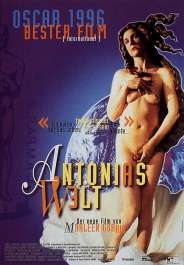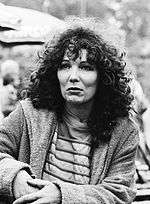Antonia's Line
| Antonia's Line | |
|---|---|
 German poster | |
| Directed by | Marleen Gorris |
| Produced by |
Gerard Cornelisse Hans De Weers Hans de Wolf |
| Written by | Marleen Gorris |
| Starring |
|
| Edited by | Wiebe van der Vliet |
| Distributed by | Asmik Ace Entertainment |
Release dates |
|
Running time | 102 minutes |
| Country | Netherlands |
| Language | Dutch |
| Budget | £1.5 million[1] |
| Box office | $4.2 million[2] |
Antonia's Line (Original title: Antonia) is a 1995 Dutch film written and directed by Marleen Gorris. The film, described as a "feminist fairy tale,"[3][4][5] tells the story of the independent Antonia (Willeke van Ammelrooy) who, after returning to the anonymous Dutch village of her birth, establishes and nurtures a close-knit matriarchal community. The film covers a breadth of topics, with themes ranging from death and religion to sex, intimacy, lesbianism, friendship and love.
Antonia's Line was made after challenges in finding locations and funding in the 1980s and 1990s. It enjoyed critical success and several awards, including the Academy Award for Best Foreign Language Film at the 68th Academy Awards.
Plot
Following World War II, the widow Antonia and her daughter Danielle arrive at Antonia's home town where her mother is dying. Antonia turns down an offer of marriage from Farmer Bas, but develops a romance with him anyway. Danielle becomes an artist and expresses interest in raising a child, while rejecting the idea of having a husband. Antonia and Danielle visit the city to find a man to impregnate Danielle, resulting in the birth of Therèse, an unusually intelligent girl. Danielle also develops a lesbian relationship with Therèse's tutor.
Years later, Therèse is raped by a man named Pitte, who had earlier raped his mentally handicapped sister Deedee. Antonia places a curse on him, after which he is drowned. Therèse is unable to find her intellectual match but eventually has a relationship with a childhood friend, resulting in her pregnancy. She decides to keep the baby and gives birth to Sarah, the film's narrator. Antonia later dies of old age, in the company of friends and family.
Cast
- Willeke van Ammelrooy as Antonia
- Els Dottermans as Danielle
- Jan Decleir as Farmer Bas
- Victor Löw as Harry
- Johan Heldenbergh as Tom
Production
.jpg)
Director and screenwriter Marleen Gorris envisioned the story as distinct from her previous work, such as A Question of Silence (1982), which she referred to as "indictments against society." She referred to Antonia as "a celebration of life," incorporating fairy tale elements and cruel details.[6] Gorris finished the screenplay in 1988. However, making the film took three attempts, with challenges stemming from putting together a large cast and finding a village that could be portrayed as realistic for a 50-year period. It was eventually filmed in Belgium.[7]
Another major challenge was finding investors.[8] Funding ultimately came from the Netherlands, Belgium and the UK.[7] With the help of producer Hans de Weers, Gorris found investors and also worked with British producer Judy Counihan of Red Hot Organization.[8] The budget was £1.5 million.[1] Filming finished in November 1994.[9]
Reception
Box office
In the U.S., Antonia's Line opened in 99 theatres, and made $1.8 million in its first 10 days. After 164 days, it crossed the $4 million mark.[1]
According to Box Office Mojo, the film completed it run grossing $4,228,275 in North America and $21,046 in South Korea.[10] In the European Union, it had 1,660,901 admissions.[1]
Critical reception

According to Dutch director Mike van Diem, the film received more positive reviews in the United States than in its native Netherlands, saying "We thought it was a good film, but nobody thought it was that good."[11] Dutch writer Hans Kroon suggested the U.S. reception was out of a need for escapism.[12] Roger Ebert gave the film four stars, saying the film showed "the everyday realities of rural life, a cheerful feminism, a lot of easygoing sex and a gallery of unforgettable characters."[13] Emanuel Levy, writing for The Advocate, wrote "It's easy to see why" the film was winning awards in festivals, calling it "an enchanting fairy tale that maintains a consistently warm, lighthearted feel," and Willeke van Ammelrooy wonderful.[14] Janet Maslin of The New York Times called it "a work of magical feminism."[15] Alan A. Stone of the Boston Review called it an "astonishingly beautiful film" representing "a truce in the gender war."[8] Kevin Thomas of The Los Angeles Times said Antonia's Line is "Beautiful, tender, hearty and poetic," and Van Ammelrooy is warm.[16] Conversely, Edward Guthmann of the San Francisco Chronicle called the film "rubbish" and the character of Antonia a "sour pickle."[17] JR of the Chicago Reader called it "humorless" "feminist rage."[18]
In his 2002 Movie & Video Guide, Leonard Maltin called it "a treat from start to finish."[19] On Rotten Tomatoes, the film has an approval rating of 70%, based on 44 reviews.[20]
Women's studies Professor Linda Lopez McAlister commented that "It seems to me that Gorris's accomplishment in this film is to have created a sense of place and characters full of life, full of quirks and idiosyncrasies and peccadillos, full of love,and rage, and desire."[21] Anneke Smelik analyzed the film, writing "It is Oedipal in the sense that it is about a family, but instead of featuring the triangle of father, mother and child, the film establishes a line of mothers and daughters." She goes on to write, "Female desire is represented in all of its diverse manifestations: Antonia's wish for independence, Danielle's quest for artistic creativity, Therèse's pursuit of knowledge, and Sarah's curiosity about life in general."[22]
Accolades
Antonia's Line won the 1996 Academy Award for Best Foreign Language Film,[19] the Toronto International Film Festival People's Choice award,[17] and two Nederlands Film Festival Golden Calf awards.[23] Gorris also won for Best Director at the Hamptons International Film Festival and Best Screenplay at the Chicago International Film Festival.[9]
| Award | Category | Recipient(s) | Result | Ref(s) |
|---|---|---|---|---|
| Academy Awards | Best Foreign Language Film | Marleen Gorris | Won | [24] |
| BAFTA Awards | Film Not in the English Language | Hans de Weers and Marleen Gorris | Nominated | [25] |
| Chicago International Film Festival | Best Screenplay | Marleen Gorris | Won | [26] |
| Audience Choice Award | Marleen Gorris | Won | ||
| GLAAD Media Award | Outstanding Film– Limited Release | Antonia's Line | Nominated | [27] |
| Hamptons International Film Festival | Best Director | Marleen Gorris | Won | [9] |
| Joseph Plateau Awards | Best Actress | Els Dottermans | Won | [28] |
| Netherlands Film Festival | Best Director | Marleen Gorris | Won | [23] |
| Best Actress | Willeke van Ammelrooy | Won | ||
| Toronto International Film Festival | People's Choice Award | Marleen Gorris | Won | [17] |
See also
- List of submissions to the 68th Academy Awards for Best Foreign Language Film
- List of Dutch submissions for the Academy Award for Best Foreign Language Film
References
- 1 2 3 4 C. Bainbridge, A Feminine Cinematics: Luce Irigaray, Women and Film, Roehampton University, 2008, p. 199.
- ↑ Tino Balio, The Foreign Film Renaissance on American Screens, 1946–1973, University of Wisconsin Press, 2010, p. 310.
- ↑ Kerr, Sarah. "Antonia's Line". The New Yorker. Retrieved 20 January 2013.
- ↑ Hunter, Stephen (26 July 1996). "Fairy tale for feminists sparkles in 'Antonia's Line'". The Baltimore Sun. Retrieved 20 January 2013.
- ↑ Strangeways, Sam (18 March 2011). "Feminist fairy tale is a lovely, meandering film". The Royal Gazette. Retrieved 30 January 2013.
- ↑ Alan Frutkin, "In Profile," The Advocate, March 5, 1996, p. 64.
- 1 2 Baumgarten, Marjorie. "Antonia's Line Is a Dutch Treat". The Austin Chronicle. Retrieved 20 January 2013.
- 1 2 3 Stone, Alan A. (Summer 1996). "A Second Nature". Boston Review. Retrieved 21 January 2013.
- 1 2 3 "Antonia's Line (1995): Miscellaneous Notes". Turner Classic Movies. Retrieved 21 January 2013.
- ↑ "Antonia's Line". Box Office Mojo. Retrieved 4 September 2016.
- ↑ Hans Krabbendam, Cornelis A. van Minnen and Giles Scott-Smith, Four Centuries of Dutch-American Relations: 1609-2009, Roosevelt Study Center, 2009, p. 1066.
- ↑ Jaap Kooijman, Fabricating the Absolute Fake: America in Contemporary Pop Culture, Amsterdam University Press, 2004, p. 97.
- ↑ Ebert, Roger (14 February 1996). "Antonia's Line". rogerebert.com. Retrieved 20 January 2013.
- ↑ Emanuel Levy, "A fairy tale," The Advocate, March 5, 1996, p. 64.
- ↑ Maslin, Janet (2 February 1996). "A Line of Strong Women With Faith in Destiny". The New York Times. Retrieved 4 September 2016.
- ↑ Thomas, Kevin (2 February 1996). "'Antonia's Line' Draws on Strength of Family, Women". The Los Angeles Times. Retrieved 4 September 2016.
- 1 2 3 Guthmann, Edward (14 February 1996). "Antonia's' Tangled Line". San Francisco Chronicle. Retrieved 20 January 2013.
- ↑ JR (8 October 1998). "The Reader's Guide to the 34th Annual Chicago International Film Festival". Chicago Reader. Retrieved 4 September 2016.
- 1 2 Leonard Maltin, ed., Leonard Maltin's 2002 Movie & Video Guide. A Signet Book, 2001, p. 53.
- ↑ "Antonia (Antonia's Line) (1995)". Rotten Tomatoes. Retrieved 4 October 2016.
- ↑ McAlister, Linda Lopez (20 April 1996). "Antonia's Line". The Women's Show, WMNF-FM 88.5, Tampa, Florida. Retrieved 20 January 2013.
- ↑ Smelik, Anneke. "Feminist Film Theory". The Feminist eZine. Retrieved 20 January 2013.
- 1 2 Barra, Allen (14 February 1996). "'Antonia's Line' sets a new mark for feminism". San Francisco Chronicle. Retrieved 20 January 2013.
- ↑ "The 68th Academy Awards (1996) Nominees and Winners". oscars.org. Retrieved 4 October 2015.
- ↑ "Film Not in the English Language in 1997". British Academy of Film and Television Arts. Retrieved 4 September 2016.
- ↑ Petrakis, John; Wilmington, Michael (27 October 1995). "`Maborosi' Captures Top Film Fest Prize". Chicago Tribune. Retrieved 4 September 2016.
- ↑ Blokker, Bas (4 February 1997). "Ellen' nominated for GLAAD Award". United Press International. Retrieved 4 September 2016.
- ↑ Blokker, Bas (14 April 2004). "Els Dottermans". NRC Handelsblad. Retrieved 4 September 2016.